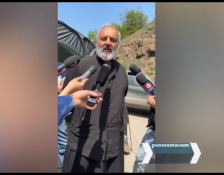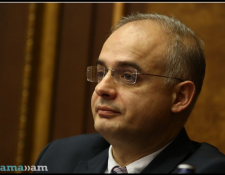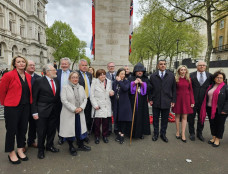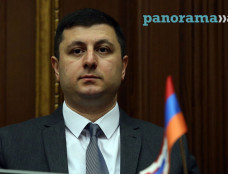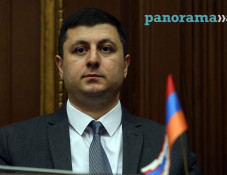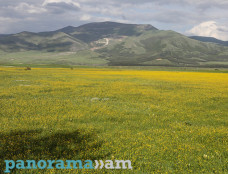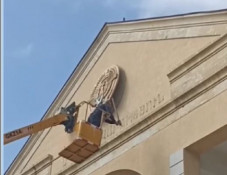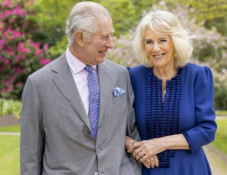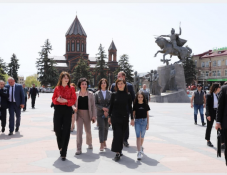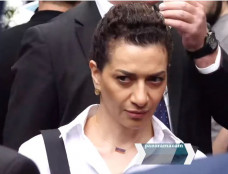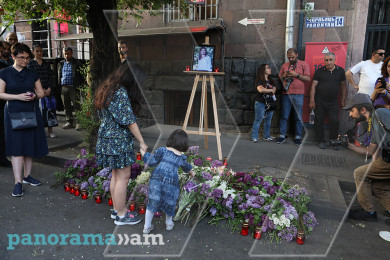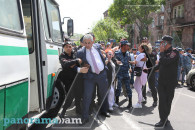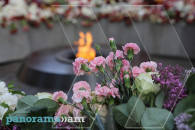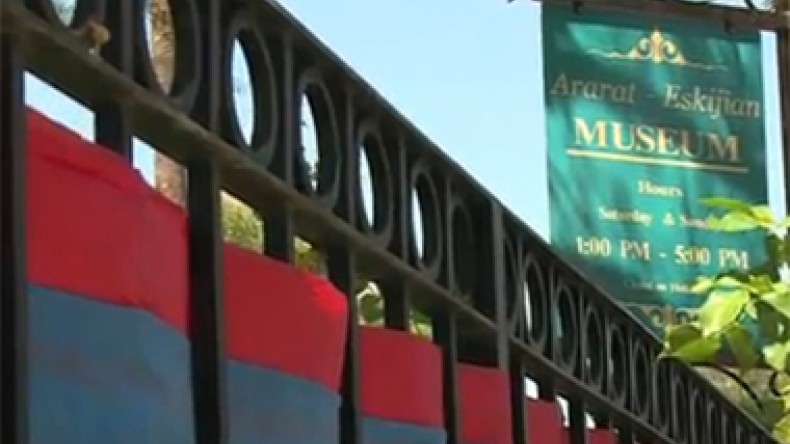
Armenian Genocide: 100th anniversary of a ‘great catastrophe’
By Olivia Ward
Thestar.com
In 1915, the Ottoman Empire’s Armenians were declared enemies of the state by the ruling junta of ultranationalists, who denounced them as supporters of their wartime foe, Russia.
Even in the dark depths of the First World War, what followed was unique in its calculating brutality.
Fiercely denied by the Turkish government, it would be denounced as the 20th century’s first genocide: an organized attempt to ethnically cleanse the Armenians from their homeland. By the time the massacres and deportations were done, as many as 1.5 million men, women and children had perished.
On April 24, Armenians throughout the world will commemorate the 100th anniversary of the event that destroyed their families, pillaged their patrimony and set them adrift with few, if any, mementos of their past.
A century later, the world is closer to understanding the facts of the “great catastrophe” that befell the Armenians, as histories of the massive killings have swelled.
“What happened in 1915 is the collective secret of Turkish society, and the genocide has been relegated to the black hole of our collective memory,” says Turkish writer Taner Akcam in a foreword to Turkey and the Armenian Ghost.
“Confronting our history means questioning everything — our social institutions, mindset, beliefs, culture, even the language we speak. Our society will have to closely re-examine its own self-image.”
As recently as this week, Turkey sharply criticized the Vatican after the Pope denounced the massacres as genocide, calling on all heads of state to recognize it and oppose such crimes “without ceding to ambiguity or compromise.”
More than 20 countries, including Canada, have passed bills recognizing the killings as genocide. The U.S. does not officially recognize the term, although President Barack Obama had used it before his election.
For decades, Turkey has insisted that the killings were part of civil war and unrest rather than organized genocide, that the Armenians had revolted against the Ottoman Empire by siding with the invading Russians in the First World War, and that although Armenians experienced a “tragedy,” they were only one of many groups that suffered heavy losses during the war.
However, “back in 1915, there was nothing controversial about the catastrophe,” Thomas de Waal writes in Foreign Affairs. The Young Turkish government, headed by Mehmed Talat Pasha and two others, had joined with Germany against its longtime foe, Russia. And two million Christian Armenians, who lived in what is now eastern Turkey, were targeted as internal enemies.
“Talat ordered the deportation of almost the entire people to the arid deserts of Syria. In the process, at least half of the men were killed by Turkish security forces or marauding Kurdish tribesmen,” said de Waal, author of the bookGreat Catastrophe: Armenians and Turks in the Shadow of Genocide. “Women and children survived in greater numbers but endured appalling depredation, abductions and rape on the long marches.”
Diplomats in the region were shocked by the carnage, including U.S. ambassador Henry Morgenthau, who accused Turkey of “a systematic plan to crush the Armenian race.”
Their reports cited torture, rape, pillage and massacres. Some Armenians were thrown into the Black Sea and drowned. One spoke of mass graves with bodies piled up “as far as the eye can see.”
But in a part of the world riven by ethnic fault lines, no historical landscape is smooth.
“Armenians were divided in the Ottoman Empire,” says Ronald Suny of the University of Michigan, author of “They Can Live in the Desert and Nowhere Else”: A History of the Armenian Genocide. “In cities of Western Turkey like Izmir and Constantinople they were relatively successful, and there were Muslim resentments toward them.”
But those in eastern Anatolia, their historical homeland, were “mostly peasants, craftsmen and workers,” who often felt themselves victims of well-armed nomadic Kurds. “Armenians only got permission (to carry arms) in 1908, but they didn’t have many weapons. It was a dangerous and insecure region.”
Consequently, their leaders demanded government reforms that would give them more rights and protection. “When that failed some joined revolutionary movements, but they were in small numbers. There were small bands that tried to defend the Armenians. Some tried to get Western powers interested in promoting and protecting their interests.”
But Suny says the great majority of Armenians were seeking improved rights and reforms within the Ottoman Empire — not to subvert the government. Nor were they “dreaming of a separate state.”
So why would the Ottoman leaders launch such sweeping attacks?
Some historians dwell on the war, territorial conflicts between Armenians and Kurds, political ambitions of the Young Turks, religious motivations and Armenian appeals to foreign countries for aid. But Suny dug for deeper philosophical and psychological causes.
“All of those background events, and the experience of Armenians, Turks and Kurds roughly from the 1870s to the genocide itself, constituted a moment I call ‘affective disposition,’ ” he said. “A mental and emotional universe formed in which the Young Turks imagined the Armenians as an existential threat so profound in their imagination that they had to be destroyed.”
From the time of Sultan Abdul Hamid II, he says, Armenians were seen as treacherous, agents of the West, and a minority that upset the natural balance of the mainly Muslim country.
The incipient Armenian revolutionary movement fuelled the flames, and grudgingly-accepted reforms urged by Europe backfired on the Armenians. Attitudes hardened as ordinary Turks were freer to go out on the streets, start boycott campaigns and make anti-Christian views public.
When the First World War broke out, some Armenians looked to the Russians as protectors against the Turks. The majority sided with the Ottomans, but efforts to prove their loyalty by joining the Turkish army and supporting the war effort failed and they were attacked and demonized as enemies within. Fear and resentment turned to hatred of Armenians.
“The organizers of the killings were the Young Turks, who ordered mass deportations and in some cases massacres,” says de Waal. “But a lot of the killing was done in a freelance, opportunistic way, often by Kurds.” Other Caucasus minorities joined in.
The Kurds, who have their own experience of repression, have apologized for their part in the killings, which they recognize as genocide. They have opened churches and spoken of reconciliation.
The Turkish government has maintained its hard line, although President Recep Tayyip Erdogan did take an unexpected step forward last year with a message of condolence to Armenians. But many were disappointed that the government scheduled a ceremony to commemorate the First World War battle of Gallipoli on the same day as their 100th anniversary.
On the ground, however, things are beginning to change, and resolution may eventually come by evolution. The path to the past may be through the future.
Descendents of Armenians who survived by converting to Islam and intermarrying with Turks and Kurds are “coming out of the shadows,” says de Waal. “They’re acknowledging they had Armenian grandparents. Now there are people who aren’t exactly Turks, and aren’t Armenians either. They are a bit of both.”
Newsfeed
Videos





